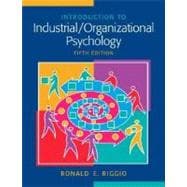
Note: Supplemental materials are not guaranteed with Rental or Used book purchases.
Purchase Benefits
What is included with this book?
| Introduction | |
| Introduction: Definitions and History | |
| Research Methods in Industrial/Organizational Psychology 18 | |
| Personnel Issues | |
| Job Analysis | |
| Employee Selection | |
| Evaluating Employee Performance | |
| Employee Training and Development | |
| Worker Issues | |
| Motivation | |
| Job Satisfaction and Positive Employee Attitudes & Behaviors | |
| Worker Stress and Negative Employee Attitudes & Behaviors | |
| Work Group and Organizational Issues | |
| Communication in the Work Place | |
| Group Processes in Work Organizations | |
| Leadership | |
| Influence, Power, and Politics | |
| Related Areas | |
| Human Factors and Occupational Health Psychology | |
| Glossary | |
| References | |
| Index | |
| Preface | |
| Introduction | |
| Introduction | |
| Definitions and History What is Industrial/Organizational Psychology? | |
| The Science and Practice of Industrial/Organizational Psychology | |
| The Roots and Early History of Industrial/Organizational Psychology | |
| The Beginnings World War I and the 1920s | |
| The Great Depression Years and World War II | |
| The Postwar Years and the Modern Era Industrial/Organizational Psychology | |
| Today and in the Future First trend: The changing nature of work Second trend | |
| Expanding focus on human resources Third trend | |
| Increasing diversity in the workforce Fourth trend | |
| Increasing globalization of business Summary | |
| Research Methods in Industrial/ Organizational Psychology | |
| Social Scientific Research Methods | |
| Goals of Social Scientific Research Methods | |
| Steps in the Research Process Formulation of the problem or issue | |
| Generation of hypotheses | |
| Selecting the research design | |
| Collection of data | |
| Analyses of research data | |
| Interpretation of research results Major Research Designs | |
| The Experimental Method Two examples of the experimental method | |
| A laboratory and a field experiment Quasi-experiments | |
| The Correlational Method Two examples of the correlational method | |
| Meta-analysis The Case Study Method | |
| Measurement of Variables Observational | |
| Techniques Self-report | |
| Techniques Measuring Work Outcomes | |
| The Bottom Line Interpreting and Using Research Results | |
| Summary | |
| Appendix: Statistical Analyses of Research | |
| Data Descriptive Statistics Inferential Statistics | |
| Statistical Analysis of Experimental Method | |
| Data Statistical Analysis of Correlational Method Data | |
| Appendix | |
| Summary | |
| Personnel Issues | |
| Job Analysis | |
| Job Analysis | |
| Job Analysis Methods | |
| Observation | |
| Participation | |
| Existing data | |
| Interviews | |
| Surveys | |
| Job diaries Specific | |
| Job Analysis Techniques | |
| Job Element Method Functional | |
| Job Analysis | |
| Position Analysis | |
| Questionnaire Critical Incidents | |
| Technique Comparing the Different | |
| Job Analysis Techniques | |
| Job Analysis and the ADA | |
| Job Evaluation and Comparable Worth | |
| Summary | |
| Employee Selection A Model for Employee | |
| Selection Steps in the Employee | |
| Selection Process Employee Recruitment Employee Screening | |
| Evaluation of Written Materials | |
| References and Letters of Recommendation | |
| Employment Testi<$$$> | |
| Table of Contents provided by Publisher. All Rights Reserved. |
The New copy of this book will include any supplemental materials advertised. Please check the title of the book to determine if it should include any access cards, study guides, lab manuals, CDs, etc.
The Used, Rental and eBook copies of this book are not guaranteed to include any supplemental materials. Typically, only the book itself is included. This is true even if the title states it includes any access cards, study guides, lab manuals, CDs, etc.